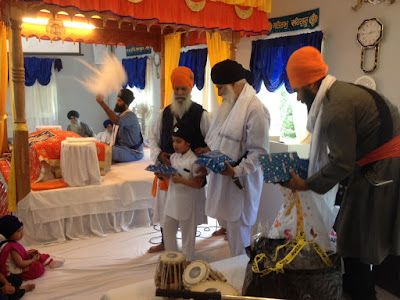Below is a very brief write-up which you could use to share with colleagues at work, school or college class fellows, or with the local media:
BANDI CHHOR DIVAS (THE DAY OF LIBERATION)
Sikhs celebrate the festival of Bandi Chhor, not Divali, which today is popularly celebrated by the worldwide Sikh community on the same day. The festival of Bandi Chhor celebrates the release from prison of the sixth Guru of the Sikhs, Guru Hargobind Ji, and 52 other princes with him, in 1619.
Sikhs celebrate the festival of Bandi Chhor, not Divali, which today is popularly celebrated by the worldwide Sikh community on the same day. The festival of Bandi Chhor celebrates the release from prison of the sixth Guru of the Sikhs, Guru Hargobind Ji, and 52 other princes with him, in 1619.
Bandi Chhor Divas, literally the ‘the day of the release of captives’, is popularly celebrated on the same day as the Indian cultural festival of Divali (the festival of lights) which is celebrated by the Hindu community.
The 17th century intolerant and cruel Mughal Emperor of India, Jahangir, wary of those who might oppose his rule, arrested the sixth Guru of the Sikhs, Guru Hargobind, and a number of others and imprisoned them in Gwalior Fort. As the festival of Divali approached he ordered the release of Guru Hargobind. To his surprise, the Guru refused to leave unless all other political prisoners were released at the same time.
Jahangir decided to compromise and said that anyone who could hold onto the Guru’s clothes could be freed with him. He thought that at the most, two or three of his fellow prisoners would be able to go with the Guru through the fort’s narrow passage to freedom. In the event, the Guru walked to freedom followed by all the 52 political prisoners holding onto tassels of varying length that had been sewn onto the Guru’s cloak.
The story reminds Sikhs to put the wellbeing of others before our own; in this case the freedom and human rights of the Guru’s fellow captives. Bandi Chhor Divas is a useful reminder to the rest of us to make concern for others part of our daily lives.
Although this time of year is propularly lit with lights and fireworks by communities, this year round, the Sikh community has decided to have no special lighting or fireworks in pain of recent events happening in Punjab, India, that has been largerly ignored by the world's media. In October 2015, there were multiple cases of the Sikh sacred scripture, considered the holiest of holy to all Sikhs, being desecrated and ripped by unknown culprits at various Sikh shrines. On 14th October, peaceful demonstraters that were sitting down and praying in protest to these sacrileges and the inaction of the Police or Government to find the actual culprits, were fired upon with bullets and beaten with canes by the Punjab Police without any warning or justified reason, resulting in the death of two Sikh civilians and many left with serious injuries.






























































